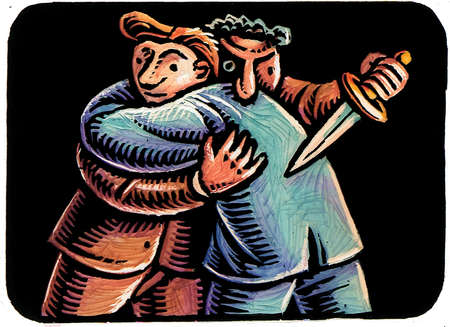 The feeling of betrayal is, perhaps, one of the most powerful of emotions. It comes up in law all the time, and now it comes up in politics with the Flynn-Russia scandal and Trump’s demonstration that making America great is not exactly his first priority.
The feeling of betrayal is, perhaps, one of the most powerful of emotions. It comes up in law all the time, and now it comes up in politics with the Flynn-Russia scandal and Trump’s demonstration that making America great is not exactly his first priority.
Before getting to the significance in politics, a quickie look at how often it comes up in the law, always starting with the premise that two people trusted each other. Without trust, of course, there can be no betrayal.
Betrayal appears with regularity in matrimonial actions, in contract disputes between business partners, and in criminal law with snitches.
Betrayal, in the form of treason, is the only crime defined in our Constitution. Yeah, it’s that strong, since it goes to our own sense of morality.
From my practice area, betrayal probably forms the single most common reason that patients contact lawyers about potential medical malpractice actions. People entrust their lives and health to others, and those others don’t do what was expected of them.
That betrayal forms the basis of an anger that results in the phone being picked up to see how, if at all, someone can get their pound of flesh. And it’s the reason some doctors are counseled to say “I’m sorry” rather than covering up errors.
And because of this very human emotion, it comes up in literature with great frequency.
Heaven has no rage like love to hatred turned, Nor hell a fury like a woman scorned. — William Cosgrove
Betrayal is the only truth that sticks. — William Miller
Though those that are betrayed Do feel the treason sharply, yet the traitor Stands in worse case of woe — William Shakespeare
And more, from John Lennon’s son Sean, since it cuts to the heart of what makes for a good story:
There are only really a few stories to tell in the end, and betrayal and the failure of love is one of those good stories to tell.
Since betrayal cuts to the soul, it’s a common theme among trial lawyers that, if used properly, can captivate an audience. It’s a story every judge and juror can relate to. If, at trial, it’s possible to show that one person betrayed the trust of another, you can be 100% certain that a competent trial lawyer will use that theme.
So now we turn to politics and Donald Trump, and bring those trial tactics to a different arena.
It is a given that those who despise Trump will never, ever be disappointed in him. Such people are incapable of being betrayed.
But what of those that believed in him? What of those that bought his hats and shouted his name? Are these not the only ones who can be disappointed, the only ones who can be betrayed?
As the weeks roll on, look to see this concept of betrayal used over and again in the political arena, with the Flynn-Russia scandal, and likely elsewhere. It is one thing for a voter to excuse the conduct of a politician by simply ignoring the boastfulness and hyperbole, but it is altogether different when the hyperbole is supported by conspiring with a foreign power.
Especially when this was the stance of the Trump-Pence administration on February 2nd during a CBS Face the Nation interview:
Look in the future for Trump opponents, be they Democrat or Republican, to pick up this theme, by going directly to Trump’s base of support.
Hell may have no greater fury like a Trump supporter scorned.

Is it true that considerable seismic activity has been detected in the area of Simi Valley, California, due, some say, to the constant spinning of Ronald Reagan in his grave?
Confirmed.
Betrayed. That is exactly why Trump was elected. People felt betrayed by the entrenched political machines of the Clintons and Bushs. There is no other explanation for his victory.
This betrayal runs deep and it’s going to take a lot more than a couple of news stories, especially from CBS and CNN, to change the mind of any Trump supporter.